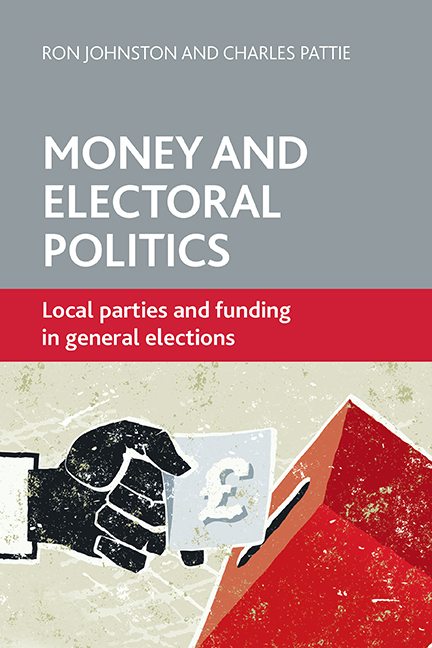Book contents
- Frontmatter
- Contents
- List of tables and figures
- About the authors
- Introduction
- one Follow the money: cash, party and electioneering in Britain
- two Money matters: local campaigns at British general elections
- three The financial health of local parties: the key to electoral success?
- four Raising the money: donations to local parties
- five Party funding futures
- In conclusion
- References
- Index
In conclusion
Published online by Cambridge University Press: 24 February 2022
- Frontmatter
- Contents
- List of tables and figures
- About the authors
- Introduction
- one Follow the money: cash, party and electioneering in Britain
- two Money matters: local campaigns at British general elections
- three The financial health of local parties: the key to electoral success?
- four Raising the money: donations to local parties
- five Party funding futures
- In conclusion
- References
- Index
Summary
The February 2013 Eastleigh by-election, discussed in the Introduction, illustrates the foundations for the Liberal Democrats’ successes at both by-elections and general elections since the 1970s. Those have been built on combinations of a strong local activist cohort, a substantial local government base (the party held all of Eastleigh's local government seats at the time of the by-election, and their candidate was one of its local councillors there; see Terry, 2013), and continuous campaigning based on local issues and claimed policy delivery, funded by local money-raising efforts aided by grants from the party's central office and the Association of Liberal Democrat Councillors. The party's problem, however, is that it has only been able to build such foundations in a minority of the country's parliamentary constituencies, and it lacks the funding to extend that base very substantially. Most of its local parties, as illustrated here, are small, with few members and insubstantial incomes and, of course, at a general election it cannot focus all of its campaigning efforts, and mobilise large numbers of party activists and volunteers, on one seat, as was the case at Eastleigh and other byelection successes in recent decades.
That situation is not peculiar to the Liberal Democrats. Labour, as again we have demonstrated here, and as the party's officials and campaign managers have admitted, is in an even weaker position overall, with very few large and active constituency parties having substantial sources of local income that can be used to sustain an organisation (with staffing and infrastructure) and to fund intensive campaigns. Few of those local parties had incomes of £25,000 or more in the years leading up to the 2010 General Election, and the party centrally was unable to contribute to their campaigning costs, when a number of their Conservative opponents were able to spend as much as £40,000 during the three months before polling day, virtually all of that money being raised locally with no subsidies from Central Office. Some constituency Labour parties were able to mobilise substantial numbers of canvassers and campaigners (including volunteers) despite their financial frailties, but these were largely last-minute responses to local situations and could not be replicated across the country.
- Type
- Chapter
- Information
- Money and Electoral PoliticsLocal Parties and Funding at General Elections, pp. 191 - 194Publisher: Bristol University PressPrint publication year: 2014



